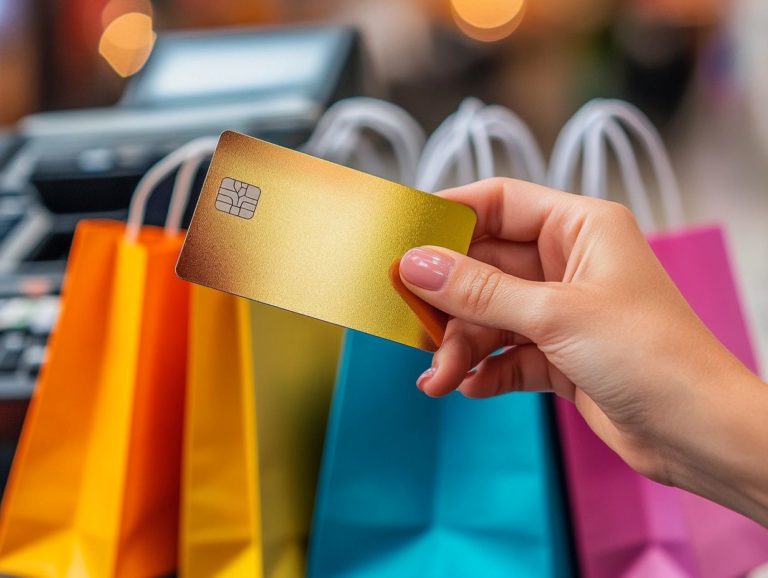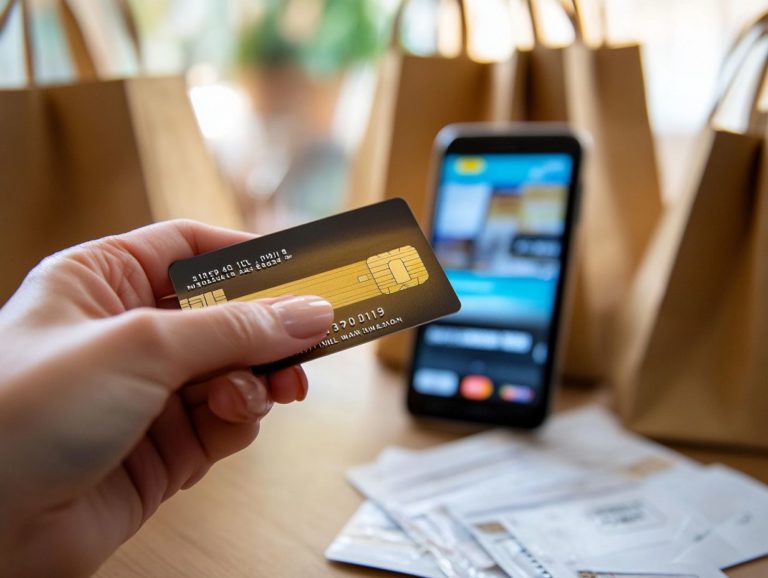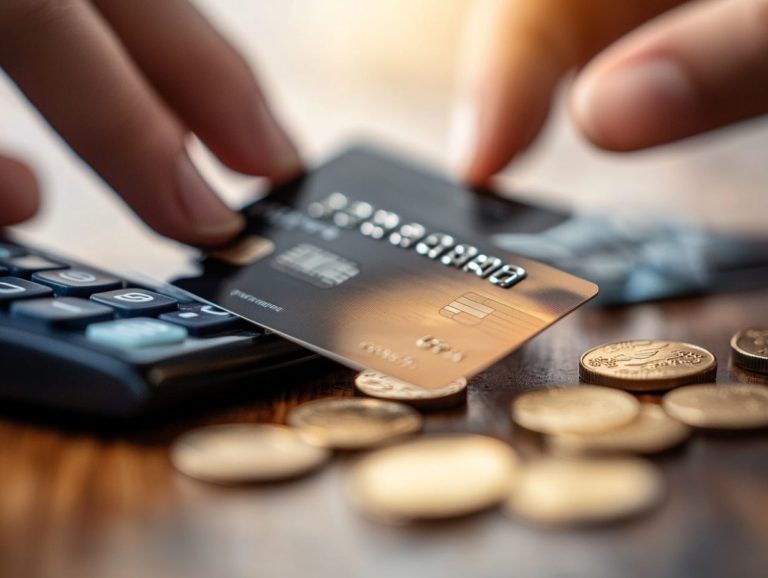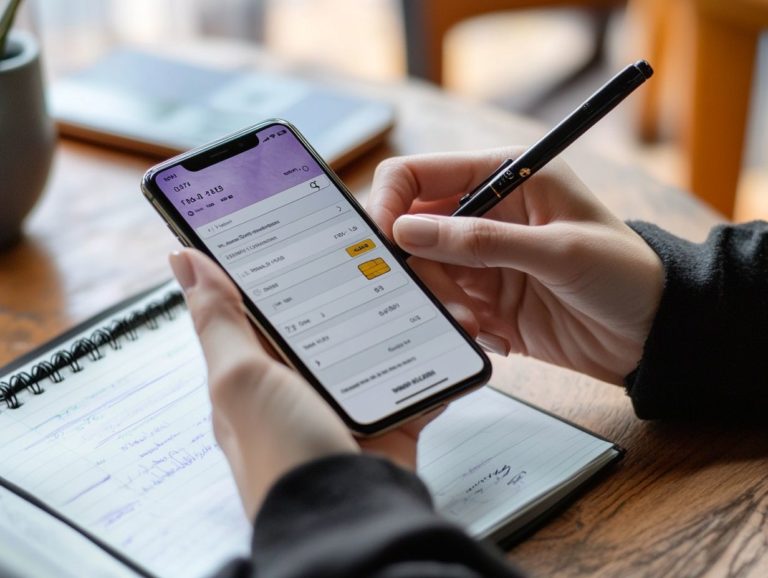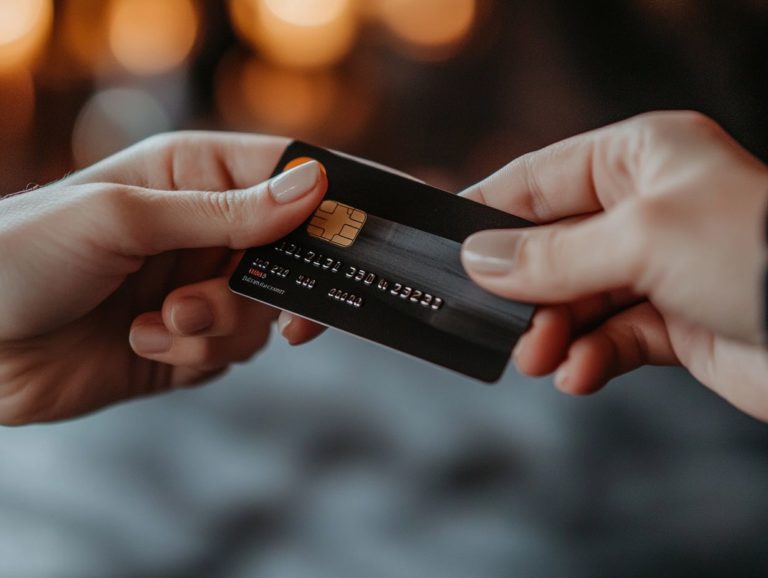How to Use Credit Cards for Emergencies?
In today s fast-paced world, emergencies can arise at any moment. It s essential to have the right financial tools at your disposal.
Credit cards can serve as a valuable lifeline in urgent situations. They provide convenience and a safety net, but understanding how to use them wisely is crucial to avoid high-interest debt.
This article explores what credit cards are, when to use them in emergencies, their advantages, and the precautions you should take. We will also look at alternatives to help you stay financially secure.
Let s navigate the complexities of credit cards together!
Contents
- Key Takeaways:
- Understanding Credit Cards and Emergencies
- Advantages of Using Credit Cards in Emergencies
- Precautions When Using Credit Cards in Emergencies
- Alternatives to Using Credit Cards in Emergencies
- Frequently Asked Questions
- Wondering what is the best way to use credit cards for emergencies?
- Curious about what you should consider when choosing a credit card for emergencies?
- What are some examples of true emergencies where credit cards can be used?
- Is it a good idea to use credit cards for everyday purchases during an emergency?
- What should I do if I am unable to pay off my credit card balance after using it for an emergency?
- Can using credit cards for emergencies impact my credit score?
Key Takeaways:

- Credit cards can be helpful in emergencies if used responsibly and with a budget.
- They offer convenience, fraud protection, and opportunities to build credit history.
- It s important to set a budget and limit, and to be aware of high-interest rates. Consider alternatives like emergency savings or personal loans.
Understanding Credit Cards and Emergencies
Understanding credit cards in the context of emergencies is essential for anyone aiming to secure their financial future. An emergency credit card provides critical access to funds when unexpected expenses arise, and knowing how to use credit cards for travel can also enhance your financial options, allowing you to borrow money during financial challenges.
Mastering credit card management like knowing interest rates and credit limits can greatly influence your credit score and overall financial health.
What is a Credit Card?
A credit card is a powerful financial tool that enables you to borrow money from a bank up to a specific credit limit. This makes transactions convenient but also carries potential risks if not managed wisely.
Understanding how these cards work is essential. They often come with enticing features like rewards programs, cashback options, and introductory offers. Pay close attention to the fine print, especially regarding interest rates and monthly payments.
Knowing about credit utilization the ratio of credit you use compared to your available limit is crucial as it directly influences your credit score. Failing to repay borrowed funds can lead to increasing debt and harm your financial health.
When to Use Credit Cards for Emergencies
Recognizing when to use a credit card can change how you manage unexpected expenses. It helps you navigate financial hiccups without slipping into credit card debt.
In situations like a sudden car breakdown or an unexpected medical bill, credit cards offer flexibility that cash often cannot. It s crucial to differentiate urgent situations from less pressing needs, where tapping into your liquid savings may be a smarter choice.
Using credit for necessary repairs can protect your cash flow and encourage healthier financial habits for the future. However, relying frequently on cash advances can hike interest rates and jeopardize your long-term financial health. Therefore, use credit thoughtfully.
Advantages of Using Credit Cards in Emergencies
Using credit cards in emergencies presents many advantages, particularly the benefits of credit cards during emergencies, such as the convenience they offer and the added protection against unexpected expenses. This can significantly reduce financial stress when immediate funds are necessary.
Convenience and Protection

Having access to credit during emergencies is a true lifesaver. It allows you to tackle unexpected expenses swiftly while offering protection through fraud monitoring and the ability to dispute a transaction if something goes wrong that many financial institutions provide.
This immediate access becomes crucial when urgent costs pop up, such as medical bills or car repairs, where you might not have enough cash on hand. With an ATM at your disposal, you can withdraw cash to cover these expenses without missing a beat.
Using a credit card responsibly can also help you build solid financial habits. Regularly reviewing your credit card statement keeps you aware of your spending patterns and encourages better budgeting. Many credit cards offer perks such as identity theft protection and travel insurance, adding an extra layer of security during those stressful moments.
Building Credit History
Using credit cards wisely during emergencies can significantly enhance your credit history, which is crucial for boosting your credit score and securing favorable terms on future financial products.
When you utilize your credit cards thoughtfully, even in unexpected situations, you not only showcase your ability to manage credit but also contribute to a stronger credit profile. This responsible approach reflects your commitment to timely payments.
By striking a balance between earning rewards points and managing debt responsibly, you can reap the benefits of smart spending. This strategy sets the stage for a stable financial future, giving you the power to make larger investments when the moment calls for it.
Precautions When Using Credit Cards in Emergencies
Credit cards are lifesavers during emergencies if used wisely! However, it’s crucial to exercise caution. Establishing a budget and keeping a close eye on high balances is essential to protect yourself from rising interest rates and the risk of falling into a cycle of debt. Additionally, knowing how to use credit cards for travel expenses can help you maximize their benefits while avoiding pitfalls.
By being proactive, you can enjoy the benefits of credit cards while maintaining financial stability.
Setting a Budget and Limit
Setting a strict budget and understanding your credit limit are essential steps to ensure that emergency spending doesn t spiral out of control. This approach leads to manageable monthly payments.
When you prioritize these elements of financial planning, you create a safety net that allows for unexpected expenses without jeopardizing your overall financial health. By designating a specific portion of your income toward an emergency fund, you prepare for life s curveballs, whether it’s a medical emergency or urgent home repairs.
Being mindful of your credit limits further helps maintain financial stability. This practice steers you away from impulsive purchases that could lead to overwhelming debt. Emphasizing the importance of a well-structured budget and a clear understanding of your available credit gives you the power to make informed decisions about your spending.
Avoiding High-Interest Rates
Avoiding high-interest rates is crucial when you re using credit cards for emergencies. Credit card debt can add up fast if the repayment amount exceeds your financial capability.
In such stressful moments, the last thing you want is to complicate your financial security by allowing high interest to accumulate. This not only puts a strain on your personal finances but can also take a toll on your credit score over time.
It’s essential to stay aware of how rapidly emergency spending can escalate, potentially leading to long-term debt challenges. To minimize those pesky interest charges, consider these strategies:
- Transfer balances to lower-rate cards
- Make larger payments when possible
- Create a budget to manage future expenses effectively
Taking these proactive steps can help you maintain financial stability and ease some of the burdens during unexpected financial crises. Start planning today to secure your financial future!
Alternatives to Using Credit Cards in Emergencies

Exploring alternatives to credit cards during emergencies offers you a more sustainable way to handle unexpected expenses. Establishing an emergency savings fund or considering personal loans can provide you with the flexibility and security needed in times of financial uncertainty.
Emergency Savings Fund
An emergency savings fund is an essential financial asset that provides you with security and peace of mind. It allows you to tackle unexpected expenses without falling into the trap of credit card debt.
By consistently setting aside a dedicated amount, you can cultivate a solid financial buffer that shields you from unexpected expenses like medical bills or car repairs. This fund plays a significant role in your overall financial strategy.
This fund helps maintain a healthy credit card usage rate, minimizing the temptation to rely on credit cards during emergencies. The disciplined act of saving gives you the power to take charge of your finances. When life throws a curveball, you ll be ready to handle it with confidence and ease.
Personal Loans
Personal loans can be an excellent alternative to credit cards during emergencies. They often offer lower interest rates and more structured repayment plans from financial institutions.
This structured approach helps you manage your budget effectively, especially if you prefer predictable monthly payments. You may discover that personal loans come with longer repayment terms, which can help alleviate immediate financial pressure.
However, it s essential to consider these benefits alongside potential drawbacks. Securing a personal loan typically requires a good credit score, and origination fees can increase overall costs. Credit cards provide quicker access to funds but can lead to a cycle of spiraling debt due to higher interest rates and variable terms.
Understanding the nuances of each option is crucial for making informed financial decisions when you find yourself in need.
Frequently Asked Questions
Wondering what is the best way to use credit cards for emergencies?
The best way to use credit cards for emergencies is to have one designated card specifically for unexpected situations. This card should have a low interest rate and a high credit limit, and you can learn how to use credit cards to build an emergency fund for added financial security.
It is important to only use this card for true emergencies and to pay off the balance as soon as possible to avoid accruing too much interest.
Curious about what you should consider when choosing a credit card for emergencies?

When choosing a credit card for emergencies, consider the interest rate, credit limit, and any additional fees or benefits offered by the card. Additionally, learn how to use your credit card for daily expenses to maximize your benefits. Look for a card with a low interest rate and a high credit limit.
Be sure to read the fine print to understand any fees or rewards associated with the card.
What are some examples of true emergencies where credit cards can be used?
Credit cards can be used for a variety of emergency situations, such as unexpected medical expenses, car repairs, or home repairs. Knowing how to use credit cards for emergency expenses is important, as it ensures that you only use the card for necessary and urgent needs.
Having a plan in place to pay off the balance as soon as possible is crucial.
Is it a good idea to use credit cards for everyday purchases during an emergency?
While it may be tempting to use credit cards for everyday purchases during an emergency, it is generally not recommended. Understanding how to use a credit card responsibly can help prevent a high credit card balance and interest charges.
Using cash or a debit card can help you avoid the stress of piling up credit card debt!
What should I do if I am unable to pay off my credit card balance after using it for an emergency?
If you are unable to pay off your credit card balance after using it for an emergency, it is important to contact your credit card company as soon as possible. They may work with you to set up a payment plan or offer other solutions to help you pay off the balance without accruing too much interest.
Make sure to evaluate your options before an emergency arises!
Can using credit cards for emergencies impact my credit score?
Using credit cards for emergencies can affect your credit score. This happens because it might raise your credit usage percentage.
If you pay off the balance quickly, it can boost your credit score. It shows that you use credit responsibly and make payments on time!

